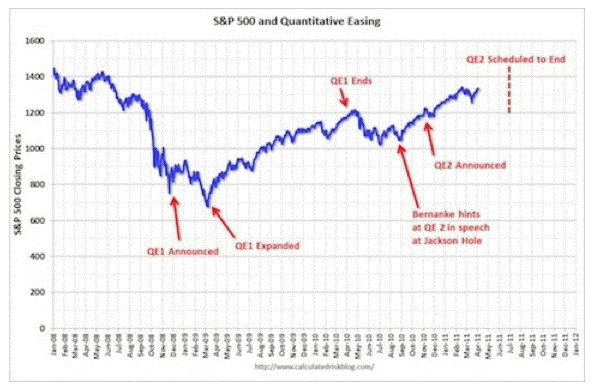The effects of ending quantitative easing
Post on: 28 Май, 2015 No Comment

In the past few years, Central Banks have been buying bonds to
- Increase money supply
- Reduce bond yields
The aim of quantitative easing is to avoid deflationary pressure and increase economic growth. Ending quantitative easing will mean
The Central Bank stop buying any more bonds. The process will then be reversed and, in time, the Central Bank will start selling the government bonds that they have.
The implications of this will be:
Falling bond prices and rising bond yields. Q.E. has had the effect of making bonds more attractive. Demand has been boosted by the Central Bank intervention, and this has encouraged investors to buy bonds (also helped by the relative security of bonds during a recession) However, when the Central Bank sell bonds, the price will go down, and this has the effect of increasing bond yields.
It is not just the Central Bank who will sell bonds. The fear is that when the markets see the Central Bank is ending Q.E. they will sell bonds because they know the market is turning. This is shown by the fact that bond yields rose following just an announcement from Federal Reserve that Q.E. may end at some time in the future
Money supply. If banks buy bonds from the Central Bank, they will see a fall in their cash reserves, and in theory, this could lead to lower bank lending as they maintain liquidity reserves.
- However, this effect may be very limited because quantitative easing in the first place didnt really encourage any increase in bank lending. Banks just sat on their increased reserves. Arguably we have had the wrong type of quantitative easing but that is another question.

Higher interest rates may cut back on growth. Higher bond yields may translate into higher rates around the economy. These higher rates will make it more difficult for firms to borrow, and this could discourage investment.
Evaluation of ending Quantitative easing
Quantitative easing has attracted a lot of money into bonds and away from more productive assets and investment. The end of quantitative easing may encourage people to stop buying bonds and invest in the real economy. This could help investment.
It all depends on the timing. If there is a strong recovery, then the impact of higher interest rates and negative effect on the money supply, will only reduce the rate of growth. If Q.E. is ended when the economy is strong, then the growth will boost shares and bonds. If growth is very weak, then the fear is that taking away the prop of Q.E. could cause the economy to go back into a double dip recession.
Depends on fiscal policy. If fiscal policy is highly contractionary, then there is a stronger case for extending quantitative easing. Many countries, from UK, US to Europe are likely to be squeezing fiscal policy over the next few years. This relies on some monetary stimulus to offset the fall in demand.
The ending of quantitative easing combined with economic recovery will both have the effect of raising bond yields. This means an increase in the debt interest payments. Currently, they are low as a % of GDP. But, rising bond yields will make it more expensive for the government to service its debt.
- However, the extent to which bond yields rise is uncertain. If there is a strong economy with general debt levels falling, there may still be reasonable demand for government bonds.
Ben Bernanke, in the past, has been keen to avoid any dangers of deflation. He has stated that deflation brings many dangers to the economy. Therefore, it is a surprise that the Fed have indicated they are considering ending Q.E. despite inflation falling to a recent low of less than 1.5%. Unemployment in the US is still high, and although there has been stronger growth than Europe, the fear is that fiscal contraction in the US, and EU recession could push the US economy back into recession. In this climate, it is hard to understand why they would want to end Q.E
Summary
End Quantitative easing too early and we are likely to see higher bond yields, falls in the stock market and a monetary contraction which could push the economy into another slowdown. This would be particularly damaging because it would harm expectations. We could have an unwelcome combination of low inflation expectations, low growth, rising bond yields and fears over the state of the bond market.
If quantitative easing is ended when the economy is doing well, then many of the fears wont materialise. Strong growth will all benefit company profit, share prices, and will help to reduce governments cyclical budget deficits. If there is strong growth, then the end of quantitative easing may be necessary to avoid demand pull inflation factors.
The big question is can we expect a strong and robust economic recovery? Could it be like the 1930s, where premature monetary and fiscal tightenening pushed the US economy back into recession in 1937? Are we in a similar situation to Japan, who also ended monetary and fiscal stimulus too early in the 2000s?














